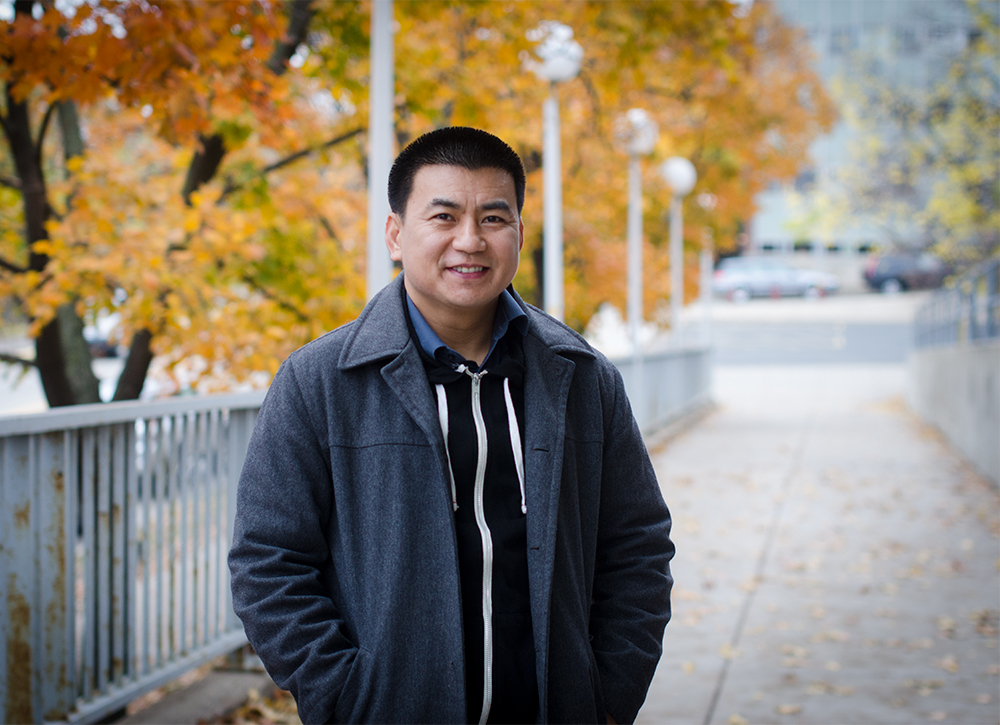Vichet Chhuon is quick to admit that, as a young person, he wasn’t a typically “good” student.
“I had curiosity, I wondered, I loved to write,” he says, “but I was often disengaged.”
Many successful educators can name teachers in their past who inspired them to become teachers themselves. But Chhuon graduated from high school without once feeling that special connection to an educator.
“People saw this Asian American young man, but they didn’t know me,” says Chhuon. “They didn’t know about Cambodian American people. They read me in certain ways that were often inaccurate.”
Chhuon came to the United States from Cambodia as a child. Born in a labor camp in the midst of horrific genocide under the Khmer Rouge regime, he grew up in Los Angeles and would later teach high school history in the city’s public schools before going on for a Ph.D.
It wasn’t until college that Chhuon was able to experience a real student–teacher relationship. Now he considers his experience to be an advantage when he’s working with students facing similar struggles.
“I’m a believer that some of our so-called worst students can make some of the best teachers,” he says. “They have an insight into valuable things.”
Today Chhuon is an award-winning associate professor of culture and teaching in the Department of Curriculum and Instruction. He uses his background in educational psychology and multicultural education to emphasize student–teacher relationships and racial justice in his work training future teachers.
Focusing on teacher diversity
As a researcher, Chhuon was looking for a way to analyze the experiences of students who, like him, felt unacknowledged in school. He and his colleagues coined the phrase “being known” after conducting research with diverse youth of color.
“‘Being known’ is when students perceive themselves as understood by teachers in authentic ways, beyond the stereotypes of youth, race, class, and gender categories,” he explains.
The results of Chhuon’s studies reflected his own experience in school. He discovered that many students of color—especially young male students of color—often cannot name a single teacher that they felt truly cared for them.
The problem is partly connected to representation. Many of his own graduate students have told Chhuon he’s the first teacher of color they’ve ever had.
Spurred by his research, his students’ experiences, and his own life, Chhuon started to focus on the issue of teacher diversity. In 2015, just less than 4 percent of Minnesota teachers were teachers of color—far below the national average and disproportionate to the racial makeup of Minnesota schools, whose students of color and American Indian students make up 28 percent of enrollment.
“When I say that teachers of color are important, it’s not just for students of color—it’s for all students,” he says, “so they see these folks who are in positions of authority and knowledge and intellect and not rely on stereotypes.”
Chhuon chairs the Teachers of Color Council, a group leading diversity work in the Department of Curriculum and Instruction. This year, the council helped launch Teacher–Scholars of Color (TSoC), a program aimed at providing mentorship, collaboration, and networks of support for its inaugural cohort of 20 teacher candidates.
“It’s a space to support each other and be supported by faculty so they stay committed and do well when they go into the profession,” he says.
In addition to his work on the council, Chhuon has emphasized professional development and more assertive recruiting practices to increase teacher candidate diversity and ensure the department is trained to support and welcome all kinds of scholars.
Justice and learning
In 2015, Chhuon earned three separate awards—in multicultural education, research, and early career achievement. Honor brings responsibility, he says: Ultimately all the work he does is to honor and benefit the community he comes from.
“I’m part of something larger than myself, than the job, than the University, than the field of education,” he says. “I think of my research as one spoke of a larger social justice and racial justice movement. Knowing that keeps me going.”
Chhuon stresses the importance of opening up and respecting the stories of individuals and their communities. And as he works with future teachers, he stresses that learning is always bidirectional—classroom success relies on an equal flow between teacher and student.
“Be open to the idea that this young person can teach you a lot,” Chhuon says. “You, the teacher, are also experiencing and developing in good ways as a result.”
Read more about Vichet Chhuon and the Department of Curriculum and Instruction.
Story by Ellen Fee | December 2016
